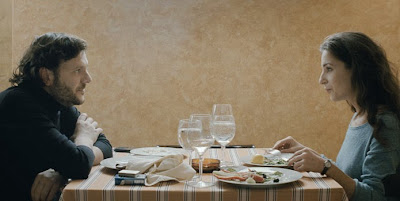While I’ve been podcasting through much of NYFF, I did not
have that much chance to talk about my two favorite works at the festival, and
one of high merit. Capsules below:
Only Yesterday (John M. Stahl, USA, 1933)
Few will be able to question a dogmatic stance that John
Stahl’s Only Yesterday is a towering
masterpiece of the classical melodrama given its rarity (not even on VHS!), but
be assured such a work is deserving of the praise. As
soon as the film’s seemingly trivial depiction of Black Tuesday (but
delightfully so—suicide never seemed so funny) begins to feel staid, Stahl
suddenly shifts toward innocent love, bitter disappointment, and ultimately the
value of life an unappreciated life. John Boles moves through his wife’s fancy
dinner party, unable to answer any questions about the crisis until he locks
himself in his office. With the gun loaded, he notices a private letter for
him, leading him down memory lane to a young woman named Mary Lane (Margaret
Sullivan) he met during the war and then abandoned, while she became the woman
who does not forget (for reasons both emotional and physical). Movement seems
to be the game that Stahl plays. Either the camera moves, or the characters
move, often in opposition, passing just for a second. The narrative involves
passing movements as well, these rare chances when diagonals of life can
finally cross, but only for a moment, and one that may lack recognition
(Stahl’s was the first adaptation of Letters
from an Unknown Woman, but where Ophuls highlights physical tragedy, Stahl
turns toward the metaphysical). A meet cute ends first as a comedy, secondly as
a tragedy, and thirdly as something beyond us entirely, a navigation of
emotional territory rarely felt in the American (or any) cinema. When the two
lovers finally collide first via a slow exchange of silent close-ups and then
finally via words, each phrase out of Boles’s mouth is an emotional dagger,
cutting right into Sullivan’s heart. But her continued gaze and affectation is
the core of the film—she is willing to let this man reveal his own hollowness,
and unwilling to believe their night was not destiny. Sullivan comes from a
theatrical background, but her close-ups stand in stark relief, a blank face
also a canvas of tears held back. While it’s wrong to create pointless value
judgements, Stahl does silent, black and white close-ups in a way that rival
any devastation created by Douglas Sirk, sometimes letting the gaze of Sullivan
carry all the pain in a way much riskier than a gambit by Sirk’s spilling of
emotions. His work is toward a quiet reverence that always respects its
protagonist, and never once falters toward anything of pity. She is a triumph
of human testament to live despite (a
word beyond her vocabulary). The ending of Only
Yesterday, both in terms of narrative and the carefully constructed mise-en-scene of the final bedroom,
brings to mind Dreyer’s Ordet. There
is no literal transcendence for this melodrama, but there is instead an
emotional one.







